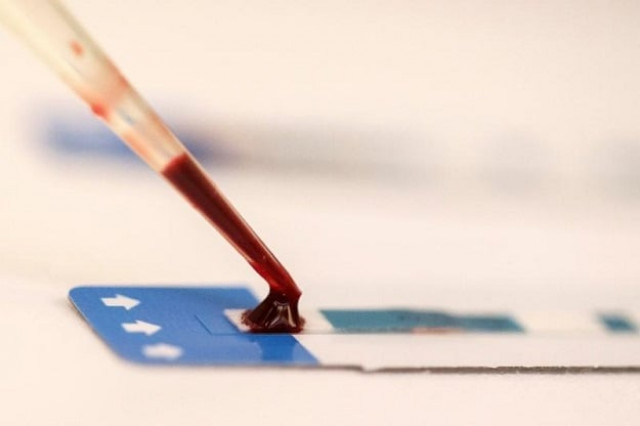‘Foreign carriers, reuse of syringes spreading AIDS’
Senate panel calls for mandatory use of auto-destructible syringes across Pakistan

A nurse tests a blood sample. PHOTO: REUTERS
The committee that took strict notice of the spread of HIV/AIDS was informed that currently a total of 681 cases have been diagnosed out of which 562 are children.
According to medical experts, most cases were spread through the use of tainted syringes. The main risk groups were identified as drug users, transgender persons, female sex workers and men who have sex with men (MSM).
In Ratodero, Larkana, HIV/AIDS spreads because of needle reuse. The committee chairman Senator Ateeq Shaikh directed authorities to stop the spread of the HIV and other diseases through the use of auto destructible syringes be made mandatory in Pakistan. The panel also passed a resolution in this regard.
Taking note of Twitter statements of the Polio Eradication Programme Focal Person Babar Bin Atta against Senator Ayesha Raza Farooq, who was heading the programme in the previous government, the chairman said as Pakistanis all of us try to fulfill our responsibilities at best.
He condemned the use of Twitter as a forum to highlight differences. Atta explained his stance. The chairman said: “All of us must think beyond party lines for Pakistan. This is the only way to move ahead.”
While discussing challenges to the Polio Eradication Programme, the committee was informed that the biggest impediment is that there is no ownership of the programme in Pakistan and that after all these years the programme is still being viewed as a Pariah entity.
Deliberating over the issue of charging students double insurance fees in case of transfer from one medical college to another, the committee took strict notice and said payment of difference can be understood but charging a double fee for the transfer is unacceptable.
Senator Ateeq Shaikh directed the Pakistan Medical and Dental Council (PMDC) to review the matter thoroughly and provide the committee with a breakup of charges. He showed concern regarding the share percentage of colleges in this equation.
The committee was informed that a notification for nominations of the selection committee under section 6, clause (1) of the Act requires approval for the federal government. In this context, a summary for the cabinet is to be submitted.
The committee chairman said it must be included in the terms of reference (ToRs) that members must be elected within a month so that pending matters may be addressed at the earliest.
Reviewing the issue of submission of quarterly progress report of accreditations case from level 2 to 3 concerning the National Institute of Health (NIH) and the Drug Regulatory Authority (DRAP), the committee was informed that WHO revised the Global Bench Marking Tool in 2019.
DRAP has now re-summarised its responses in the new computerised Global Benchmarking Tool and submitted it to WHO. WHO assessment team will share its response on DRAP's self-assessment during this period. Moreover WHO intends to conduct first audit inspection of DRAP in September 2019 and the second audit visit will be in October 2019.
The panel also discussed the Shifa International Hospital issue and noted that it was never a charitable organisation and the land acquired for the hospital was not granted by the government but was bought according to market rates at that time.
Ateeq Shaikh instructed the hospital administration to provide details to the committee as to whether or not the Shifa International Hospital is a charitable entity and a teaching hospital. Details of the MOU with the Capital Development Authority (CDA) and any other organisation were asked for as well.



















COMMENTS
Comments are moderated and generally will be posted if they are on-topic and not abusive.
For more information, please see our Comments FAQ